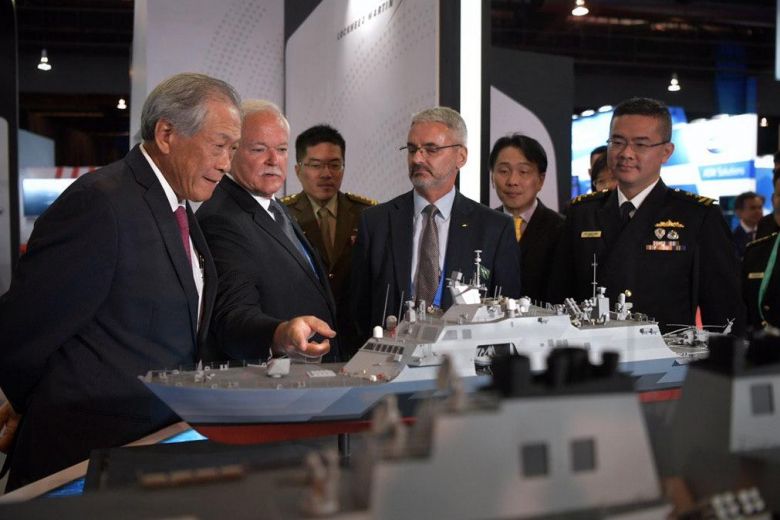Strong consensus needed on common rules for the seas: Singapore minister

Defence Minister Ng Eng Hen (left) viewing an exhibit at the 12th International Maritime Defence Exhibition and Conference Asia, on May 14, 2019.ST PHOTO: KUA CHEE SIONG
SINGAPORE, May 14, 2019, The Straits Times. With a threat of terrorism from the sea and the difference in rules adopted by countries over freedom of navigation and maritime resources, there is a need for more collaboration between governments and militaries, Defence Minister Ng Eng Hen said on Tuesday (May 14), reported The Straits Times.
“Maritime history teaches us that whenever and wherever there is conflict on the seas, surrounding countries and their common folk invariably suffer,” he said.
“Because so much depends on the seas, we need strong consensus from all countries for common rules for the seas and their use.”
Dr Ng was giving an address at the opening ceremony of the 12th International Maritime Defence Exhibition and Conference (Imdex) Asia, a biennial maritime defence show held at the Changi Exhibition Centre.
Attending the ceremony were 26 defence and navy chiefs, vice-chiefs of navy, and directors-general of coast guards, as well as show participants from more than 40 countries.
More than 230 firms will participate in the three-day show organised by Experia Events, with 25 warships from 15 countries – including the United States, China and India – visiting Singapore for the occasion.
Dr Ng said that Singapore, at its heart, is a maritime area, citing how influences from faraway lands have reached across the seas to alter the lives of millions in the region.
“Today, global connectivity has increased by leaps and bounds through air, land, sea and the Internet,” he said. “But the seas still hold powerful forces that can continue to shape the destinies of our countries, individually or collectively.
“Indeed, as global commerce has increased, so too has the significance of sea lines of communication as global arteries for trade.”
Despite global uncertainties, including trade disputes and security tensions, trade volumes through the seas have been going up and are expected to increase further.
While traditional maritime threats persist – such as transnational maritime terrorism, piracy, armed robbery and the trafficking of drugs, weapons and humans – better cooperation and organisation has led to improvement in some of these areas, said Dr Ng.
However, there are other new challenges that require more work.
Terrorist threats from the seas on the southern flank were a concern during the Trump-Kim summit held on Sentosa last year, and the SAF had to mount considerable protection, with the Maritime Security Task Force working closely with the Indonesian navy to secure these waters, he said.
There is also a need to step up intelligence efforts as the centre of gravity of global terrorism shifts from the Middle East to other parts of the world, including this region, which has been susceptible to radical ideologies.
Dr Ng cited how experts believe that most of the weapons used by militants during the recent conflict in Marawi, Philippines, came via the sea, and ISIS-linked terrorists such as the Abu Sayyaf group also continue to threaten the safety of seafarers by abducting the crew of transiting ships in exchange for ransom.
Different rules adopted by different countries on the use of global maritime commons are also of concern. These do not just include rules that relate to freedom of navigation, but also extend to maritime territorial claims on fisheries and other resources.
The number of military and law enforcement-related incidents has increased, and even fatalities have resulted, he said, citing a case in 2013 when a fisherman from Taiwan was shot dead by a Philippine Coast Guard vessel carrying out enforcement duties.
There is much that governments and militaries can do to build trust and confidence through cooperation and collaboration, said Dr Ng, with the Experts’ Working Groups under the Asean Defence Ministers’ Meeting-Plus (ADMM-Plus) being one example.
In November 2017, the ADMM-Plus navies adopted and practised the Code for Unplanned Encounters at Sea, and did so again at the Asean-China Maritime Exercise last October, and at the ADMM-Plus Maritime Security Field Training Exercise, which ended on Monday (May 13).
“These initiatives between regional navies reduce the risks of misunderstandings and unintended escalation between our warships,” he said.
In conjunction with Imdex Asia 2019, the Republic of Singapore Navy (RSN) is co-organising the sixth International Maritime Security Conference with the S. Rajaratnam School of International Studies, which begins on Tuesday.
The RSN is also hosting the Maritime Information-Sharing Exercise during this period.